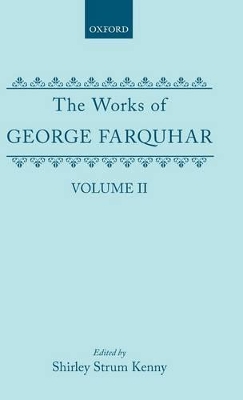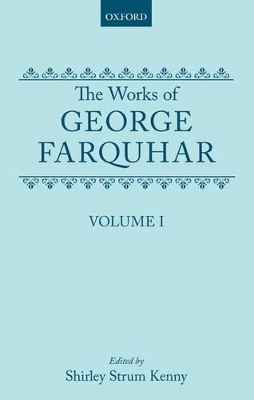Oxford English Texts
2 total works
George Farquhar (1678-1707) was perhaps the best, and certainly the most popular, playwright to appear at the turn of the 18th century. He captivated audiences with his lively good-natured comedies, and romanced the leading actresses and female playwrights. In addition to his eight plays, he wrote many poems, letters, an epic, and a miscellany--all before his untimely death at less than thirty. Shirley Strum Kenny has provided the first scholarly edition of the works since 1730; she has added to the canon materials not printed since the beginning of the 18th century, some of which have never been identified as Farquhar's. Each work is accompanied by an introduction.
George Farquhar was the most popular, and perhaps the best playwright of his time. The Irish-born actor and military officer arrived in London before he was twenty, captivated audiences with his lively, good-natured comedy, philandered with the leading actresses and female playwrights, married a widow with children, and wrote, besides the eight plays, many poems, letters, prologues and epilogues, an epic, and a miscellany, before his untimely death in 1707, not yet
thirty.
Shirley Strum Kenny has provided the first scholarly edition of the works since Stonehill's in 1730, in a reliable old-spelling text. She has added to the canon materials not printed since the beginning of the eighteenth century, some of which have never before been identified as Farquhar's.
Each play has an introduction describing its sources and composition, theatrical and publication history, influence, and textual problems. The introductions to the non-dramatic works contain similar information, and relate the works to the contemporary events which occasioned them. Questions of authorship for newly-identified works, and possible or doubtful attributions are carefully considered.
thirty.
Shirley Strum Kenny has provided the first scholarly edition of the works since Stonehill's in 1730, in a reliable old-spelling text. She has added to the canon materials not printed since the beginning of the eighteenth century, some of which have never before been identified as Farquhar's.
Each play has an introduction describing its sources and composition, theatrical and publication history, influence, and textual problems. The introductions to the non-dramatic works contain similar information, and relate the works to the contemporary events which occasioned them. Questions of authorship for newly-identified works, and possible or doubtful attributions are carefully considered.

